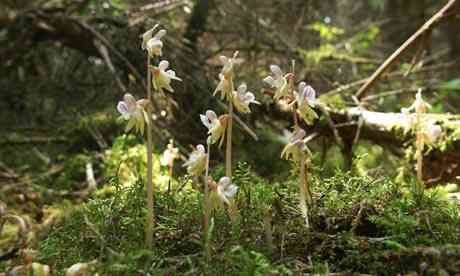
Ghost orchids, spoken archaic in the UK last year, have not long ago been sighted in this country. Photograph: BerndH
Three class thought to be archaic have been found again, to the pleasure of conservationists.
In the UK, the singular spook orchid, spoken archaic in this nation usually last year, has been found in England, and a caddisfly – a small drifting insect – last seen some-more than a century ago has been detected again in Scotland. On the tellurian theatre the yellow-spotted bell frog, reputed "possibly extinct" by the International Union for the Conservation of Nature, has been seen on a creek-bed in Australia.
The great headlines stories follow a notice by a heading IUCN consultant that humans are right away pushing plants and animals to annihilation faster than new class can evolve.
Simon Stuart, the IUCN consultant who chairs the Species Survival Commission that declares class involved or extinct, pronounced that nonetheless rounded off one "possibly extinct" class each year was re-discovered, most some-more plants and animals were combined to the list.
There will additionally be stability regard for class that are re-discovered in really small numbers. For e.g. usually a singular 5cm high spook orchid was found by the botanists who suggested it is still alive in the UK. The sighting of the caddisfly by a PhD tyro next to a stream in north-west Scotland – 350 miles north of the prior record, according to the charge gift Buglife – could serve indicate the shift of meridian shift in pushing class out of their normal habitats, something a little plants and animals will be means to conform to improved than others.
"The total point of the "possibly extinct" list is they can come in and out," pronounced Stuart. "But we"re adding class on to the "possibly extinct" list most faster than we"re receiving them off it."
The IUCN has most stricter manners about dogmatic a class entirely extinct, together with that it contingency have been actively searched for by teams of experts in the field. However in 2008 the Switzerland-based organization did have to move the Miles" pirate frog (Craugastor milesi) from the archaic to critically involved list after a singular citation was found in Honduras.
Among the reasons conservationists be vexed a class being spoken archaic are that it is no longer probable to get income to investigate and safety the habitat. The locations of the orchid and the Australian frog are both being kept tip to strengthen them, however one of the bell frogs and a tadpole have been taken to Taronga zoo in Sydney for a serf tact programme.
No comments:
Post a Comment